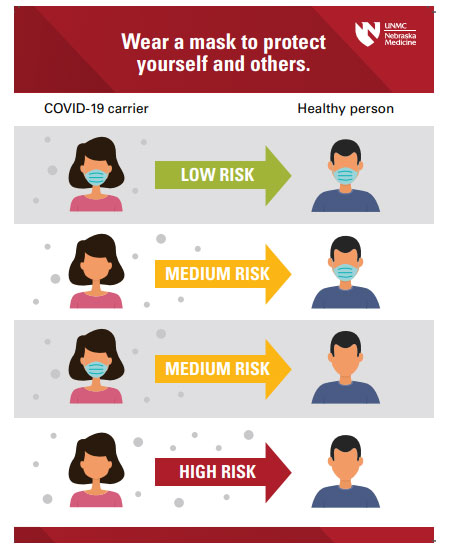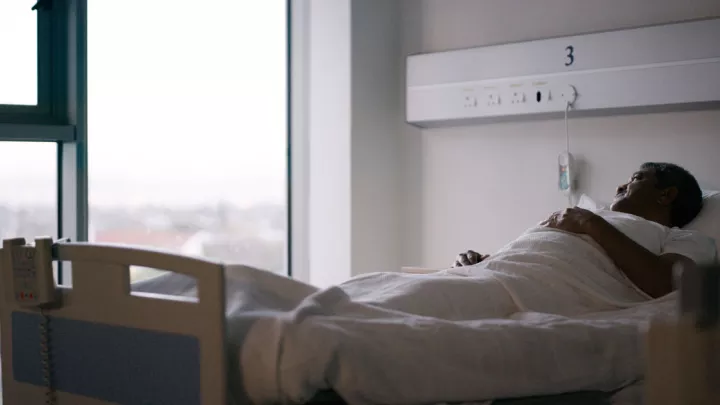In memory of George Floyd, many people across the nation are gathering in large groups to protest police brutality. It is your right to make your voice heard, and we encourage you to continue fighting for justice. Systemic racism is a public health issue. Even so, the coronavirus is still spreading in our community, with 697 new cases reported so far this week in Douglas County. If you join public gatherings, prevent the spread of COVID-19 by wearing a mask.
Some people – especially people who experience discrimination regularly – don’t feel comfortable wearing a homemade mask in public. This is a huge concern. If you don’t feel safe wearing a mask in public, try to maintain six feet of distance from others when you can. Avoid talking loudly to protect the health of those around you.
Does wearing a mask prevent COVID-19 spread?
Masks minimize how many infectious particles are released into an area. Infectious particles are the most common way that COVID-19 spreads from person to person. An infectious person expels infectious particles while sneezing, talking, laughing, yelling, coughing or singing. An infectious person can even spread infectious particles just by breathing.
The louder you talk, the more droplets you spread to others. Coughing emits more infectious particles than talking, and sneezing is even worse. Since many people with COVID-19 never show symptoms, many people are infected that may not know it. Wearing a mask limits the spread of potentially infectious particles.
However, wearing a mask doesn’t just help others – it limits your own exposure, too. According to a study in Hong Kong, wearing a mask in public was effective for the SARS coronavirus (a virus very similar to the new coronavirus that causes COVID-19). The study found that people who frequently wore a mask in public were half as likely to be infected.
Remember: I wear a mask to protect you. You wear a mask to protect me. By not wearing a mask, you put others’ health (as well as your own) at risk.
Masks work – if worn properly
Double-layered cotton masks block 70.7% of infectious particles (respiratory droplets), if worn properly.
The thing is, many people are not wearing masks properly, which causes COVID-19 to spread.
- Is your mask covering your mouth and nose? To prevent spreading infectious particles, keep your mask over your mouth and nose. If you drop your mask to talk, you will spread droplets. If you’re having trouble making yourself heard through the mask, speak up. It’s not helpful to bring your mask to an event and then wear it around your neck.
- Do you touch the front of your mask? By touching the front of your mask, you might infect yourself. Don’t touch the front of your mask while you’re wearing it. After taking your mask off, it’s still not safe to touch the front of it. Once you’ve washed the mask in a normal washing machine, the mask is safe to wear again.
For more information, see these tips from How to wear a face mask: dos and don’ts.
Can masks cause carbon dioxide poisoning?
You may have heard that wearing a mask will cause carbon dioxide poisoning. The mask might hold a very small amount of carbon dioxide, but the carbon dioxide can pass through the holes on the sides and even the pores of the material itself. Humans inhale trace amounts of carbon dioxide all day long and suffer no issues. Some carbon dioxide is a good thing and helps regulate your blood levels.
An extremely high level of carbon dioxide would need to build up to cause a problem. So no, wearing a mask shouldn’t cause carbon dioxide poisoning.
Do your part and wear a mask
In addition to wearing a mask, be aware of your surroundings and use good sense. Encourage smart COVID-19 practices:
- Maintain six feet of separation from others when you can
- Join an outdoor gathering rather than an indoor gathering, because better airflow makes infection less likely
- Wash your hands with soap and water frequently. Avoid touching your face
- If you’re not feeling well, protect others from COVID-19 by staying home



